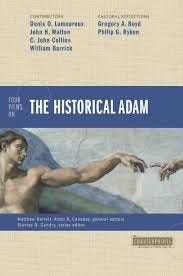I try to read decent books every month. It’s a habit I recommend. So this series of “What I Read” will attempt to give short summaries and ratings of that month’s books. FYI the links in this article are affiliate links to Amazon. So if you buy something from a link I may earn a tiny bit.
Four Views on the Historical ed by Adam Denis O. Lamoureux
I found this book a bit disappointing and was relieved to find that others had as well. That means it isn’t just me misunderstanding the project. In fact The Gospel Coalition published a review to the same effect. I don’t find any of these four to be satisfying although William Barrick’s view would be the closest to one I would accept. I’m more in the Old Earth camp, but view Adam and Eve as real figures. So this book showed me some of the views of others, but those weren’t actually views that I fully agreed with.
The Problem of Pain by C.S. Lewis
This book challenged me. It challenged my understanding of what 1 John 4:8 means by “God is love.” Lewis writes:
I should very much like to live in a universe which was governed by such lines [where happiness and kindness abound and they always lead to good things]. But since it is abundantly clear that I don’t, and since I have reason to believe, nevertheless, that God is Love, I conclude that my conception of love needs correction. … Love is something more stern and splendid than mere kindness. … Kindness, merely as such, cares not whether its object becomes good or bad, provided only that it escapes suffering. (32)
Then he made the comment that we as humans tend not to want a heavenly father as much as we want a heavenly grandfather who indulges our pleasures. That struck me too.
His point seems to be that pain in our lives serves as a sort of corrective discipline to make us into who we should be by God’s design:
We are, not metaphorically but in very truth, a Divine work of art, something that God is making, and therefore something with which He will not be satisfied until it has a certain character. (34)
The Fourth Turning is Here by Neil Howe
The main idea in Neil Howe’s view of history - as I understand it - is that history turns on lifetimes. So he uses the term saeculum to denote the long span of a life and asserts that each saeculum sees 4 generations turn into adults. These 4 generations end up fitting 4 categories: hero, prophet, artist and nomad. He thinks that all of history since the protestant reformation can be seen through the lens of repetitive cycles that occur at the turn of each generation. If you think that sounds like a clean and neat organization - it is. That’s why I have a problem with it. This particular book asserts that the current fourth turning began around the 2008 financial crisis and will resolve somewhere at the end of the 2020s or beginning of the 2030s. To over simplify his view of the present situation: It’s gonna get worse - much worse. Then things will get better and a new sense of order will begin to be established in the 2030s and 2040s. Then toward the 2050s and 2060s we (if I’m still alive) will see another awakening of some sort. Again, this is all very neat and tidy. I’m just not sure people (or history) work that way.
Words by Jean-Paul Sartre
This book is an auto-biography. He mostly describes his childhood from what I think is a post-Freud perspective. I may be wrong about that, but he definitely had a unique relationship with his family. He talks about his draw/push towards writing that began as a child and his love for books. He uses wordplay brilliantly and this book kept my attention. Not all auto-biographies do. I found it interesting that he was related to Albert Schweitzer. An interesting, but not necessary read.
Conclusion
What are you reading? What have you read recently that you think I need to read? Like any book lover, I’m always looking to add something to my future reads list.








My favorite English professor was an existentialist and fan of Sartre for better or worse. We studied No Exit, which was interesting.